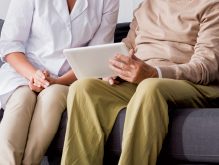By Michael Cohen,
Founder, Center for Brain
If your child or teenager…
• Has been diagnosed with ADHD
• Is making poor grades
• Is impulsive.
• Makes poor decisions or choices
• Can’t make or keep friends
• Experiences or creates lots of “drama”
• Seems angry all the time
• Is oppositional and won’t cooperate
• Is disruptive to the family
• Doesn’t follow the rules
• Has difficulty following directions
• Struggles to complete tasks independently
• Is unmotivated.
• Has difficulty going to sleep or waking up.
Then your doctor, a concerned teacher, or even a well-meaning friend may have suggested you try medication, but you wonder:
 “Is there something I’ve missed?
“Is there something I’ve missed?
Are there alternatives to medications?”
Attention and behavioral problems are NOT due to a deficiency of Ritalin, Concerta, Focalin, Vyvance, Adderall or any other stimulant drug.
If medications work, they may give quick results but their drawbacks can outweigh the benefits because:
• Once medication is stopped, any perceived gains also stop. Medication doesn’t teach your child or teen how to build attentional skills or improve self-control.
• Medications typically don’t help processing issues or learning disorders. These often drive part of the problem but may not be well-identified.
• They can cause sleep and appetite disturbances. Parents report other possible side effects from tics to changes in personality.
There’s good news on the ADHD treatment front: You have a choice.
You do not need to give your teenager a stimulant to help him or her make gains in:
• Attention
• Behavior
• Academic achievement
• Sleep
• Hyperactivity
• Self-control
Even if your teen is already on medication, he or she may be able to reduce or eliminate it over time with a doctor’s help.
OUR COMPREHENSIVE PROGRAM FOR ADHD TREATMENT
For many challenged kids, standard methods to help them learn to control attention or behavior, or improve their learning, don’t work well.
EVERY TEEN or child can learn to do better. But it’s often impossible for parents or schools to provide the level of positive reinforcement an ADHD teenager needs in order to overcome their issues.
Our comprehensive ADHD treatment program uses a unique combination of Neurofeedback, Neurotechnology (such as brain mapping), biofeedback and nutrition to evoke real and lasting change.
WHY NEUROFEEDBACK?
Neurofeedback employs special EEG technology to measure brain circuits – the ones that cause distraction, lack of motivation, inattention, hyperactivity, oppositional behavior and sleep issues – and provides feedback to create change.
Here’s an example of one of our Neurofeedback exercises:
Your teenager sits in front of a TV monitor
watching a movie. Whenever the brain activity gets too fast or too slow and the mind wanders, the movie picture fades out.
It becomes a challenge – and a game – to keep the video playing by getting those brain waves back where they belong. Entering the desired “zone” is rewarded by the video continuing to play clearly.
Experiencing the game over multiple sessions (repetition) and being rewarded by the video playing smoothly goes right to the core of what Neurofeedback and our other tools are designed to accomplish: Long-lasting, healthy brain changes by repetition and positive reinforcement.
If You Practice Enough,
You Can Learn ANYTHING.
Once these changes in brain activity are practiced and learned, the effects tend to hold. This result is similar to the result one gets from practicing a golf swing until “muscle memory” becomes strong and a good swing occurs more often than a poor one. It’s also like practicing multiplication tables or scales on a piano.
Training creates more connections in the brain and more appropriate brain functioning, which improves how it works and makes medication less important or unnecessary.
As the training progresses, the training helps your child one become more emotionally resilient and aware, and they have greater attentional flexibility. There is also an increase in self-control, motivation, and much better sleep.
Parents often notice after Neurofeedback, that their child often is calmer. Things don’t bother them as much. They control their emotions and frustration much better.
Long-term research shows when children or adolescents demonstrate better self-control, they are more likely to have academic success and, later in life, to achieve greater economic and social success.
THE BRAIN MAP – AN INSIDE LOOK
How do you know which brain circuits aren’t working efficiently?
The ideal first step in helping an ADHD teen is to create a brain map. Brain maps show activity in the brain. The map looks at 45 areas of the brain that relate tobehavior, attention, processing of information, executive function, and emotional control. This map reveals problem areas that correlate with the teen’s issues so those specific areas can be addressed in treatment.
Creating a brain map is painless, noninvasive, and takes about an hour.
A brain map uses a 19-channel EEG recording which analyzes activity compared to other adolescents and young adults (aged norms).
THE ROLE OF NUTRITION
Many parents have tried diet changes without success. That doesn’t mean nutrition doesn’t play a role – but often, it’s not nearly enough by itself. There’s also an overwhelming amount of advice and often, parents aren’t sure what to do and what really works.
We’ve spent years looking at the research and observing what works in practice. We help point you to information about food and supplements that are known to enhance brain function and help ADHD, as well as other problems.
Stimulant medications can temporarily improve brain function, but proper nutrition – either diet, supplements, or both can help when combined with the right tools.
Good nutrition combined with Neurofeedback and/or body Biofeedback creates a synergy that helps everything work together better.
What Is Neurofeedback and How Can It Help Kids, Adults, and Families?
NOT A “QUICK FIX”
This approach is definitely not like popping a pill. It takes more time. Our comprehensive program may take 25 sessions, at a rate of two or three a week, to see some significant results.
Initial changes are typically observed within 5-10 sessions. Repetition is a very important element of why this works. Much like going to the gym, the time it takes to succeed varies from individual to individual. Results will occur if you stick with it.
IS THIS COVERED BY INSURANCE?
We are out of network for insurance providers. However, we will generate an insurance bill with reimbursable insurance codes which you can submit for reimbursement if you have out-of-network coverage, or if you have a health savings account or a flexible spending account.
WHY CONSIDER NON-DRUG THERAPY?
You are investing in your child or teenager that will change his or her life. It gives them a chance to learn skills and succeed without medication.
That can impact the rest of their life. But the benefit to the parents or family are huge also. Here’s examples of how we see our programming impacting children, teenagers and their families:
1) Reduced tutoring, therapist, and doctor visits spent “managing the problem”
2) More confidence & success in school and work
3) Reduced time with school/homework issues
4) Increased motivation and follow-through
5) Improved social relationships
6) More comfortable household/family events
7) More stable mood and increased cooperation
8) Improved sleep
9) Improved decision-making
CAN WE DO THIS AT HOME?
If you are unable to come to our office we are able, when appropriate, to provide certain home-use equipment, and to supervise at-home sessions remotely as needed.
CONTACT US TO LEARN MORE
To learn more about the many exciting options available for your teenager, call (561)744-7616 for a free 15-minute telephone consultation. Or, ask for an in-person consultation. We can better assess the situation face to face. It allows us to help review whether this is a good fit for your situation. You can also visit CenterforBrain.com for more information.
Check Also
Trusted Homecare Agency: Serving Veterans with Free Supplemental Home Healthcare
When it comes to healthcare, veterans deserve the best care possible. For veterans seeking in-home …
 South Florida Health and Wellness Magazine Health and Wellness Articles
South Florida Health and Wellness Magazine Health and Wellness Articles




